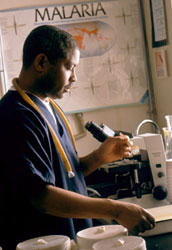NIAID-funded centers seek to enhance malaria control
July / August 2011 | Volume 10, Issue 4
Malaria has been eliminated from many parts of the globe, yet approximately half of the world's population remains at risk of contracting the disease. In July 2010, the National Institute of Allergy and Infectious Diseases (NIAID) awarded funds to establish the International Centers of Excellence for Malaria Research (ICEMR), which form a network of independent research institutions in malaria-endemic regions of Africa, Asia, the Pacific Islands and Latin America. These regions include some of the focus countries of the President's Malaria Initiative (PMI), an effort that since 2005 has worked to fight malaria in the regions most affected by the disease.

Photo courtesy of NIAID
A new program tries to meet the
need for sustainable,
multidisciplinary strategies to
control malaria.
The ICEMR program is based on the need for sustainable, multidisciplinary strategies to control malaria. The centers will integrate clinical and field approaches with laboratory-based immunologic, molecular and genomic methods. They will adapt their research to changes in malaria epidemiology and emerging research needs as well as to scientific opportunities within the specific regions. Findings are expected to help inform how new interventions and control strategies are designed and evaluated in the future.
The ICEMR program will support malaria research in more than 20 countries and will provide the knowledge, tools and evidence-based strategies to support researchers working in a variety of settings, especially within governments and healthcare institutions. The program is expected to bring critical infrastructure to malaria-endemic regions and help build the needed training and research capacity to combat malaria around the world.
More Information
This article was adapted from NIAID Global Research: Improving Health in a Changing World [PDF 7M, 24 pages].
To view Adobe PDF files,
download current, free accessible plug-ins from Adobe's website.